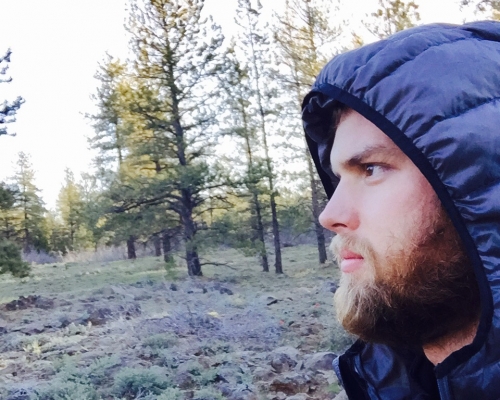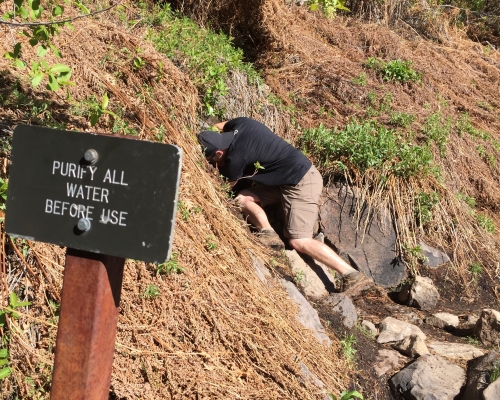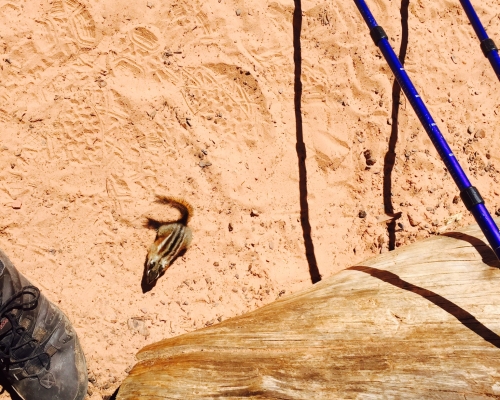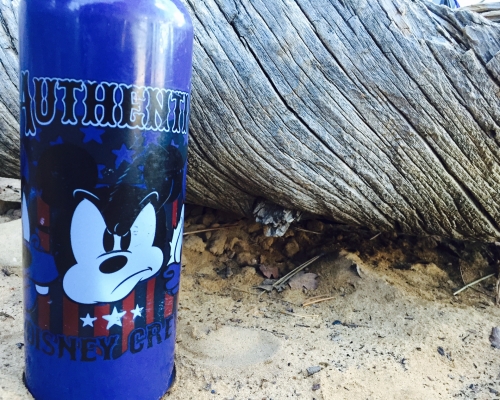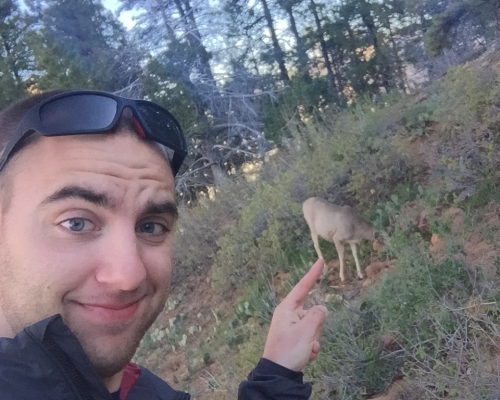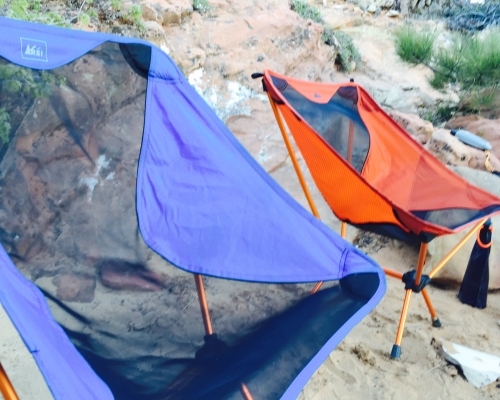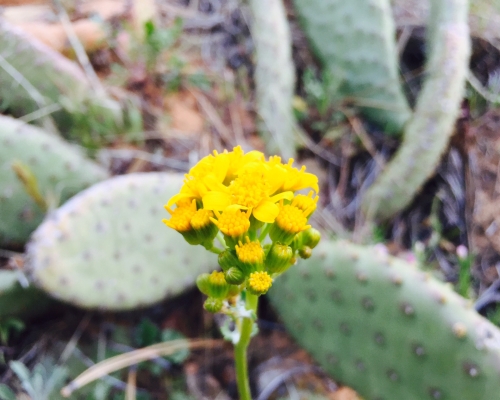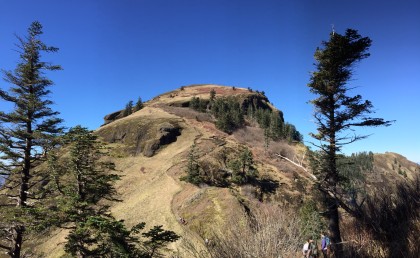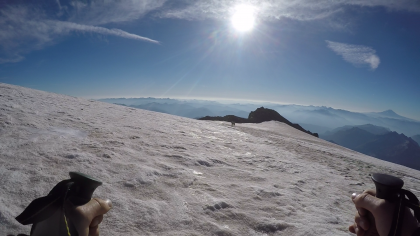Zion: The Experience – Day 3 – Wildcat to Zion
As I slept, a familiar dream haunted me with vivid detail. A pitch black sky appeared inky and sloshing against fog-like clouds. Beneath it: a field of gold – thousands of tall, thin, light-brown stocks of grass swayed in an invisible breeze. A trail divided the field which led to a dense forest where small ponds filled with fry salmon jostled for aquatic space. How did I know this? Somehow I just did.
A woman in black stood a few yards away with her back turned facing the forest. A large black crow sat on her shoulder taking drags off a toasty looking cigarette. A second crow lay on the ground with its feet in the air, very clearly swollen and on the verge of death. The sun shone down on this scene but the source of light could not be seen. It was swallowed up by the jet black sky, yet it illuminated everything as clearly as it would on any cloudless summer day.
I walked forward towards the woman but the closer I got the slower my movement became until everything was frozen in time and space. After what seemed like an eternity of frozen silence, physical cracks began to spread outward from the place where she stood. I tried to shut my eyes but found that they were locked open. I could only stand mid stride and watch as the cracks spread across the image in front of me. They crept closer and closer until they reached my fingers and toes. I tried to scream as their painful crawl trickled up my limbs but found that my mouth too would not move.
The woman slowly turned to glance at me and I was struck by an odd familiarity in her face. She whispered, “you were the best thing that ever happened to me.” Then she laughed and ran swiftly in to the forest just as the entire image shattered along the crack lines that had been forming, plunging everything in to total darkness.
Day 3 – Wildcat to Zion
“Shake the silence and hear what it says.
The tranquil pride that become[s] the lie.”
Only For The Weak – In Flames
Trail Guide: Backpacking Through Zion National Park
Previous: Zion: The Experience – Day 2 – Kolob to Wildcat
Next: Zion: The Experience – Day 4 – Zion to ????
I awoke suddenly in a cold sweat; rage gripping my mind. It was still dark outside. Pure silence surrounded our little forested campsite in the middle of Zion National Park. I fumbled around in the gear loft for my phone. 2 o’clock in the morning – great.
It had been a chilly night, the coldest of the trip. Cheval and I had camped at an elevation of nearly 7,000 feet, or 1.32 miles above sea level. The chill in the air was similar to what I had experienced on the Indian Heaven plateau, except drier. Beads of moisture leave your face and float around like a mysterious fog. At any minute you’re sure they’ll crystallize and fall to the ground as miniature snow flakes, but they never do. Such was life on the plateau.
Later that morning, as the sun rose and light filtered through the trees, I stood up and took a big gulp of frosty, spring air. The sun’s warmth pierced the cold, which began to thaw the earth and our faces.
“You know what would be great?” I said.
“What?” asked a groggy Cheval from what appeared to be layers of cold weather gear bundled on a small camp chair. Slight wisps of condensation erupted from a tiny slit in the fabric as he spoke. I was wearing all of my layers as well and was thoroughly impressed by the ability of my down jacket to retain body heat while maintaining an ultra-light and compact presence in my bag. Brilliant gear addition.
“I’m almost certain there is a wonderful view up there,” I said pointing at the sky, a mad smile spreading across my face; my fingers and toes tingling with excitement.
A few minutes later, Zed1 was ready for take-off. It buzzed to life and ascended slowly up to the tree line to gaze coldly at the early morning sun. After a few panning shots I noticed that the cold had taken a significant toll on the battery life of the device.
As Zed1 began to descend, a breeze began to filter through the trees causing flight to become erratic. I could hear the motors straining to keep the machine balanced; the sensors and on board computer working like mad to interpret this invisible force.
The gap between the trees was much too narrow for any kind of flight error and I foresaw the crash before it happened. A sharp thwack erupted as the propellers clacked against wood and the computer immediately killed powered to the external motors. With the power cut, it went in to a 50 foot free fall and landed with a loud crunch on the pine needle covered ground. Zed1 was down.
I knew the damage was bad even before seeing it. One of the propellers was significantly bent and another had a large chip. The frame around one of the rear motor arms had been cracked nearly straight through and was being held together by a few strands of plastic, arterial, sub-frame.
“Kind of figured that would happen,” commented Cheval, now standing to observe the devastation in my hands. I looked down sadly at the critically injured Zed1 and silently began to pack up it’s remains for the trip home.
Day 3 promised a 12 mile trek across the Horse Pasture Plateau over varying terrain. Our intended path would follow the West Rim Trail heading south towards Zion Canyon, Angel’s Landing, and the Grotto.
This was a major milestone in our journey. Though we would not have to make any course altering decision on this day, we anticipated that our arrival at the Grotto the following day would be a decision point for the rest of the trip. Because, despite all of our preparation and planning, one unknown remained: would there be shuttle service at the east entrance of the park? The answer had not been made clear by official sources and other hikers didn’t seem to know either. Our hope was that a resource at the visitor information center would answer this question for us.
After eating a hearty breakfast of freeze dried eggs, oatmeal, and peanut butter mixed with nutella, we packed up camp and set off. The death of Zed1 hung solemnly in the trees as we left our pristine campsite behind.
Only a short while on to the trail, we arrived at a sign post which read: PURIFY ALL WATER BEFORE USE. It seemed unusual that a sign like this would sit in the middle of the trail. Yet there it was.
—
“We’re from Georgia,” the man said, unfastening a canteen from his pack. The rest of the group, probably around 5 or so, followed suit unpacking various water reservoirs and containers. “Where ya’ll from?”
“We’re from Portland,” replied Cheval, producing a large Nalgene bottle and SteriPen.
The source of the water was virtually undetectable aside from the very clear trickling sound that filled the air. A small slit in the rock face near the trail exposed a tiny sliver of running water. The opening was just big enough for a medium sized Nalgene or Camelbak bottle.
As we took turns refilling we exchanged stories about where we had started, where we were going, knowledge of Zion, and postulated about what lie ahead. Your fellow hikers can often times be your best resource on the trail. However, still nobody knew if there was shuttle service from the east entrance of the park.
—
In reflection, I contend that this trip was different from any other in the Pacific Northwest, not simply because of the climate and terrain, but because it was an occasion.
Folks from all over the country and from different walks of life come to witness the majesty of Zion by the hundreds of thousands every year. They take time out of their busy lives to experience this place. Yes, it’s beautiful to look at, but if looking was fulfilling enough then people would stay home.
For many it’s not enough. And it’s not purely for the visual aesthetics, it’s for the feelings as well as the memories that those feelings create. It’s experiences like these that are so valuable and it’s the reason why this site exists: to pass on, even just a modicum of, what those encounters with the natural world entailed.
The coldest morning of the trip turned in to the hottest day, but not unbearably so. My pack thermometer measured low 80s with a slight breeze. Not bad.
As we hiked along the dusty path in silence, sweat seeped from my skin as if the arid plateau itself was trying to wring me dry like a damp washcloth. The initial discomfort of multi-day backpacking tends to melt away as a steady rhythmic pace develops. In Zion, hours would pass with short breaks in between for snacks and re-hydration but time elapsed differently out here. It felt like a world far away from everything else.
That day we encountered a handful of groups traversing the plateau. Each on their own journey; each enjoying the world around them. There were also quite a few of these strange hybrid chipmunk-squirrel creatures that roamed the plateau scavenging for stray bits of trail mix.
However, we were on the lookout for another type of creature: the rattle snake. We had read that it wasn’t unheard of to see one chattering away on or off the trail. Neither one of us wanted to get caught off guard by one of these potentially dangerous serpents. We were constantly wary of our surroundings. It was in our good fortune that we never needed to use our first aid kits on the duration of this trip.
We were constantly checking mileage and elevation, or at least I was constantly nagging Cheval to check his GPS for these vital bits of data.
“We’re almost there, right?” I asked through shortness of breath. I had leaned over on to my trekking poles and was bracing the front straps of my pack against the tops of the pole handles in a quadrapod position. This had become a common resting technique when there was nowhere flat to sit or we did not feel inclined to take our heavy packs off.
“Probably another mile… mile and a half…” replied Cheval who was several yards ahead sipping through a tube that connected to a water bladder inside his pack. A hint of frustration had bubbled to the surface of his tone and was likely due to the repeated stops and breaks I was forcing on our team. Not to mention the additional time I had spent shooting video and taking pictures.
“Not sure you’ll be able to fit in at Angel’s Landing without a full selfie stick for that GoPro,” mused a snarky Cheval. I understood his frustration and had often pondered the merits of bringing so much media equipment with me. Before our trip had officially start I had opted to leave the full tripod in the car and instead only packed a small, light-weight mini tripod for the GoPro. Many miles later, I was very thankful for this decision.
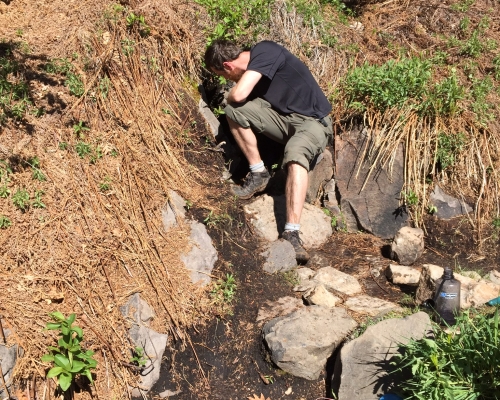
—
The landscape that we were walking through now was unlike anything that we had seen previously in the trip. Grand vistas and distant orange, brown canyons sprawled all around us. Zion was beginning to truly open up before our very eyes; each view becoming more extraordinary than the next. I was glad I at least had some gear to capture an aspect of these visual gems.
Muscle fatigue is a real concern during multi-day backpacking. Combine this with an inadequate intake of nutrients and your body will actually begin to eat itself as it starts looking for other sources of sustenance.
Potassium deficiency can stop the heart from working properly and will prevent broken down muscle fibers from repairing. Drinking all the water in the world will not replenish the electrolytes lost from having expelled multiple liters of water out your orifices during a day long hike in the blazing sun. That’s why eating smart, nutrient dense foods constantly and consistently is important on the trail.
One technique for retaining water is to simply breath through the nose instead of the mouth. According to medial research, breathing orally equates to a 42% increase in net water loss over nasal breathing.
Let’s say that on a typical day, 400 ml is lost through nasal respiration. If we apply the scenario above where respiration is done orally, this would mean that an additional 172 ml of water would be lost for a net water loss of 572 ml.
There are quite a few variables at play here: hydration, humidity, ambient temperature, physical activity. Many things can cause the human body to sweat and breath heavily, thus increasing water loss. Extrapolate this increase over the course of an entire day of hiking and the difference breathing technique can make in water consumption is significant.
—
My mind pondered all of this as we encountered slope after slope on the winding trail. It was the ascending sections which made nasal breathing challenging. My already sore muscles strained to transport a 240+ pound payload across the plateau. They screamed for a quantity of oxygen that was noticeably absent at this elevation.
Seeing the sign that marked the path to our campsite that evening was incredibly uplifting. We had already passed several campsite markers an unknown number of miles back and each one stood as a promising symbol that we were making progress towards our destination. But they were also little reminders that we had further still to go. At each bend in the trail our eyes began to strain for any indication of a small brown and white sign post labeling campsite #2.
At each let down, and there were many, the various areas of the body would yell and complain to one another about the inequities and injustices of this long and arduous journey.
—
Brain: “Alright everyone – we’ve got another mile or so to go. Let’s pull it together and reach camp in one piece.”
Hands: “Oh. Okay…”
Feet: “Are you kidding me? I mean, we’re not blistered, but our pads feel like they’ve been shattered like plate glass falling out of the back of a pickup truck. I thought you told us we had a mile left about an hour ago?”
Legs: “Feet, you’re not the ones having to move this entire body plus the massive pack that Brain thought we needed. If today’s trip isn’t finished within the next 20-30 minutes than we’re out. Y’all won’t be moving without us.”
Heart: **thump-thump-thump-thump-thump-thump**
Back: “Legs, you should just relax, man. I’m the one actually supporting this parasitic satchel of hate.”
Hips: “Actually, Back, you’re not. Hip strap, bro.”
Legs: “Yeah, GTFO Back, you’re just a big support column for Brain and his propaganda.”
Stomach: “Stomach want fooooood.”
Brain: “Guys, listen. Everything will be fine. You’ve all done a great job and I’m very thankful for your support through this challenge.”
Eye balls: “Oooooooooh snap, son! Look over thuuuur! Water sign, yo?!”
Mouth: “My god… we’re here!”
Brain: “Mouth, did you just say that out loud?”
—
We had arrived at a junction in the trail. A short distance away signs gave visual confirmation of three pathways. One sign pointed out a short trail to a water source, a second indicated that the West Rim trail continued on to the Grotto, and a third sign led to our reserved campsite. A trifecta of wonderful options.
After one final push up the hill, Cheval and I looked down from the most extraordinary vantage point of the entire trip. It was arguably better than Angel’s Landing. Our campsite sat on the edge of Zion canyon. It was elevated above the main trail and provided a striking view the canyon walls nearly a mile away.
As I hastily unpacked my camp chair and slumped back in its comfortable embrace the weight of the world fell away. Quite literally just yards from our campsite a 1,500 foot sheer drop sliced into the earth and formed one of the main arteries of Zion. And this was all ours for the night. We felt privileged; we felt like hiking gods.
Only a short distance back along the trail was another campsite which was shrouded in trees and looked nothing like ours. We were truly fortunate to have selected a site and received one with this kind of awe-inspiring, mural of excellence.
There is a moment on truly epic hikes where the surreal becomes very real. Suddenly you realize that the wildness of your surroundings is the way life used to be. For a brief moment you think “this must be reality, but what does that mean life back home is?”
Early 21st century living in the first world means having but wanting more. When you’re a well-trained consumer, why produce?
We no longer hunt woolly mammoth; we hunt workplace problems. We marshal the evidence for our agenda like battalions of soldiers and throw them at “the other side,” reloading our statements in the same way that you would switch out a rifle magazine. We get married and have children as a social imperative; not as a means of survival. It’s the “American dream” they say.
We crave “the better” in the sense that whatever we have is no longer good enough. We buy shit that we don’t need to impress people that we don’t like. We fight wars against abstract enemies because it feeds our primal need to make progress. Not the kind of progress that benefits the human race, but progress in the sense that “we can and therefore we will” while our interests dictate both the fantasy and reality of our perspective on the world.
Maybe it was time to stop fighting those ghosts; those distractions from what is real and true.
—
As I sat on a cliff overlooking the vastness of Zion I slowly began to realize how sad it must be to not be able to perceive the stagnation that so many are stuck in.
But at the same time I wanted to laugh. As the sun began to set and the already vivid colors of the canyon walls became more intense, I began to feel more determined than ever. I will never become stagnant; I want to evolve.
That night I slept more soundly than on any other night that trip.
Trail Guide: Backpacking Through Zion National Park
Previous: Zion: The Experience – Day 2 – Kolob to Wildcat
Next: Zion: The Experience – Day 4 – Zion to ????
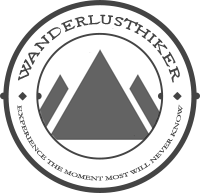
The content of this website is purely for informational purposes and is intended as a reference guide. The authors and everyone involved in the creation of this website make no warranty of correctness or thoroughness and disclaim any and all liability from its use.
We use Google Adsense and Amazon Affiliate links to keep this site running. To support us simply view our pages or click a link.
Copyright © 2025 Wanderlust Hiker. All Rights Reserved.
